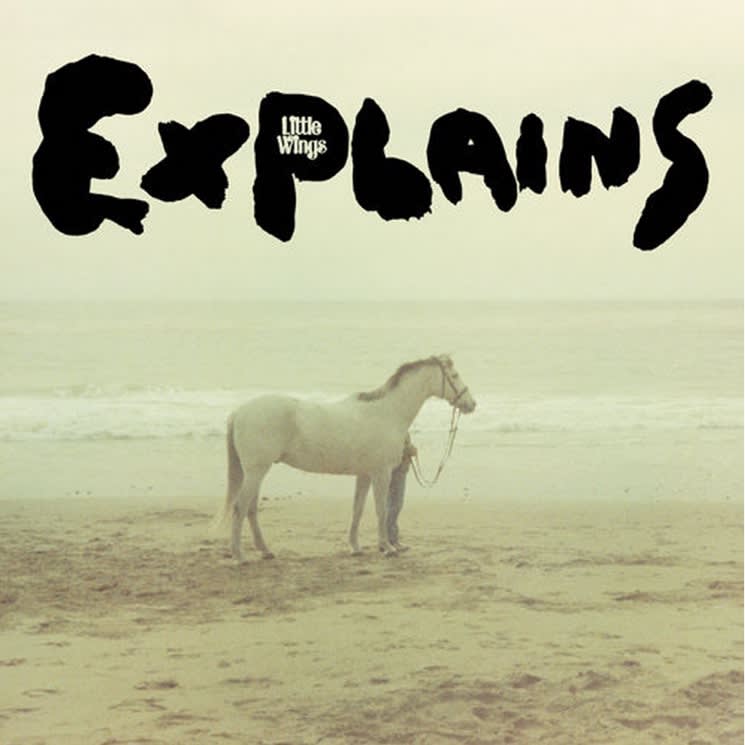Even though Explains is the first Little Wings record to come out on the coveted freak flag-waving Woodsist label, it already feels like somewhat of a homecoming. Kyle Field, the man behind the project, is the embodiment of the modern troubadour, and, for years, he's roved between largely obscure labels, offering up his lo-fi folk songs to whoever will have them. Now, with a sizeable catalogue under his belt, his arrival on Woodsist — a label known for taking projects from their lo-fi bedroom confines and billowing new wind into their sails — comes as a fated turn in Field's prolific bardic journey.
On Explains, for the first time, Field seems to be transcending the line between songwriter and song — somehow becoming his music. A close listen, which is what Field's music and his hushed vocal ambling demand, shows how he is discovering this mode of songwriting for the first time, how he runs through fast-paced, free-associative poetry almost like a Henry Miller novel in musical form. This is best demonstrated on songs like "Light Brang," in which his tangles of lyrics flow in a stream of sometimes funny, sometimes poetic, sometimes sombre stanzas: "Look at what that light brought / Run with it like a metaphor / Sleepy hollow headless and my neighbour calls me Ichabod," he sings in a style not unlike that of a Southern rapper. "Let me rewind like playback / How bout the swings are stay back / T.G.I.F. don't you know I just can't wait to lay back?"
The drawback is that the lyrics are often too hushed and garbled, which makes it seem like he doesn't really care about what he's saying, and so maybe you shouldn't, either.
Elsewhere, the album finds Field singing about nature and his profound connection with it ("Blade of Grass," "A Sky," "Hollowed Log"). As on all Little Wings albums, Field applies the same weight to even the most gleeful scenarios: lines like "Fe fe fi fi fo fo fum" receive the same emotional heft as ones about death and dying. It's almost as though radio never made it to Field's remote corner of America, like he was never told how to sing, or what a good singer should sound like, as though he's a mere conduit for this pastoral American folk music — you can't tell where tradition ends and what he's created on his own begins. The effect is beguiling and thought provoking, inviting listeners to sit back and think about things like how fast the grass grows.
(Woodsist)On Explains, for the first time, Field seems to be transcending the line between songwriter and song — somehow becoming his music. A close listen, which is what Field's music and his hushed vocal ambling demand, shows how he is discovering this mode of songwriting for the first time, how he runs through fast-paced, free-associative poetry almost like a Henry Miller novel in musical form. This is best demonstrated on songs like "Light Brang," in which his tangles of lyrics flow in a stream of sometimes funny, sometimes poetic, sometimes sombre stanzas: "Look at what that light brought / Run with it like a metaphor / Sleepy hollow headless and my neighbour calls me Ichabod," he sings in a style not unlike that of a Southern rapper. "Let me rewind like playback / How bout the swings are stay back / T.G.I.F. don't you know I just can't wait to lay back?"
The drawback is that the lyrics are often too hushed and garbled, which makes it seem like he doesn't really care about what he's saying, and so maybe you shouldn't, either.
Elsewhere, the album finds Field singing about nature and his profound connection with it ("Blade of Grass," "A Sky," "Hollowed Log"). As on all Little Wings albums, Field applies the same weight to even the most gleeful scenarios: lines like "Fe fe fi fi fo fo fum" receive the same emotional heft as ones about death and dying. It's almost as though radio never made it to Field's remote corner of America, like he was never told how to sing, or what a good singer should sound like, as though he's a mere conduit for this pastoral American folk music — you can't tell where tradition ends and what he's created on his own begins. The effect is beguiling and thought provoking, inviting listeners to sit back and think about things like how fast the grass grows.
